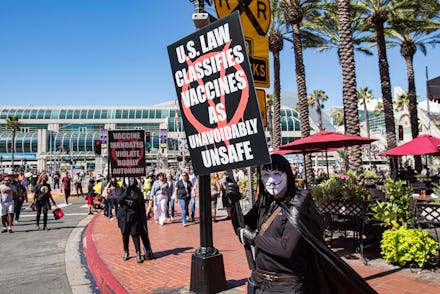There's no coronavirus vaccine — but that hasn't stopped anti-vaxxers from spreading conspiracy theories about it

There is still an incredible amount of uncertainty surrounding coronavirus, which has already infected more than four million people and claimed more than 300,000 lives globally. Even as cases start to slow in some regions, the risk of a second wave looms, either caused by loosening restrictions too soon or by changing weather conditions in the fall. The development most likely to put an end to the pandemic is a vaccine. And while one does not yet exist, and could be months if not years away, an effort to push back against the theoretical drug is already underway on social media, where misinformation about coronavirus has thrived.
Dialog surrounding coronavirus has been a minefield of bad information. This has not been helped by a lack of cohesive guidance from the federal government. While a normal administration would likely rally around the most reliable information available, the Trump White House has opted to roll out experts and then let the president wing it for a bit about whatever rumor or random tidbit he spotted on Twitter. These ramblings have typically undermined any guidance being provided by actual medical experts and have led to apparent squabbles between the President and government agencies.
This dynamic has created more than just awkward relationships within the White House — it has created a vacuum for reliable information about an evolving public health crisis. "In times of uncertainty, we all want information. Where no clear information exists, individuals turn to informal sources of information," explains Jennifer Reich, a professor in the Department of Sociology at the University of Colorado Denver and author of Calling the Shots: Why Parents Reject Vaccines.
Reich notes that most people have only been aware of the novel coronavirus for about 4 months, and only affected by it for about 2, at least in the United States. That creates a dynamic of constant change and requires clear messaging about what is known, what isn't, and what is happening. "If we had consistent information from leaders about what we do and don’t know and how hard experts are working to find out more, it could be easier to fill some of those spaces where we don’t have clear information," she tells Mic. "Instead, we have little guidance from CDC on safe openings, we have inadequate information about the process by which vaccines or medical solutions will be studied, and we don’t have national leadership messaging the importance of patience and trust."
As a result, more people are turning to social media, and the information they find is often anything but reliable. According to a study published this week in the journal BMJ Global Health, more than one out of four of the most popular coronavirus-related videos on YouTube contain misleading or factually inaccurate information. The researchers looked at a total of 69 videos which have amassed more than a quarter of a billion views over the last two months. Researchers found that some of the misleading videos even contained "statements consisting of conspiracy theories" and "inappropriate recommendations inconsistent with current official government and health agency guidelines."
When asked about the study, a spokesperson for YouTube told Mic:
We are always interested to see research and exploring ways to partner with researchers even more closely. However it’s hard to draw broad conclusions from research that uses very small sample sizes and the study itself recognizes the limitations of the sample. We’re committed to providing timely and helpful information at this critical time. To date we've removed thousands and thousands of videos for violating our COVID-19 policies and directed tens of billions of impressions to global and local health organizations from our home page and information panels.
YouTube isn't the only platform that is subject to misinformation regarding coronavirus. Platforms including Facebook, Twitter, Instagram, TikTok, and Medium have all been flooded with coronavirus related content, and most do not have the human moderator teams in place to sift through it all. This has created a challenge in stopping the spread of potentially harmful and inaccurate content and has turned these platforms into hotbeds for conspiracies.
Those who already oppose vaccines are unlikely to accept a coronavirus vaccine no matter what. But their preemptive disinformation campaign runs the risk of causing vaccine skeptics to skip out on something that is potentially life-saving. Research suggests that the lack of information is already starting to plant seeds of doubt within the minds of some vaccine skeptics. Scott Ratzan, the founder of the International Working Group (IWG) on Vaccination and Public Health Solutions and distinguished lecturer at the CUNY Graduate School of Public Health and Health Policy, tells Mic that he has been polling New Yorkers on their intentions of getting a coronavirus vaccine, should one become available. His most recent survey found that 53 percent of the 8,000 people polled would take it, while 29 percent said they would not. The polling marks a steep decline from just two weeks earlier, in which Ratzan said 62 percent reported they would take the vaccine. "This decline parallels that of respondents’ perception of their likelihood of infection," he says.
The information battle on the coronavirus vaccine is already underway, and the side of expertise runs the risk of losing without improved messaging. "We need better communication and framing of the facts in ways people can obtain, process, and understand the health and scientific information so that people can choose vaccination," Ratzan says. He adds that sophisticated advocacy and communication, ranging from one-on-one conversations to information disseminated on social media, is critical to improving vaccine literacy, which will in turn result in countless lives saved.